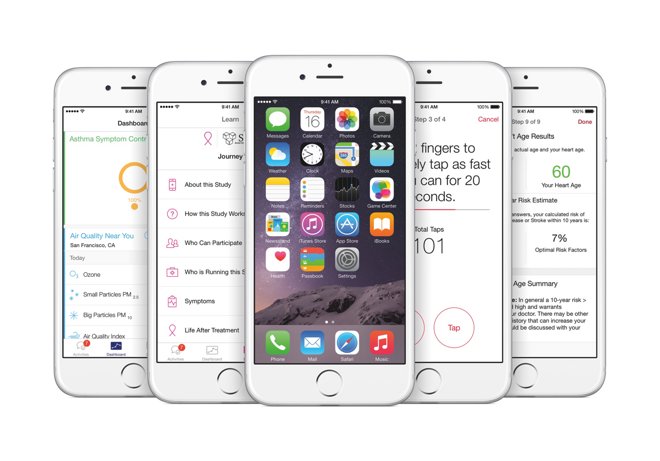Apple on Tuesday made its open-source ResearchKit tools for developers openly available, paving the way for doctors, scientists and others to gather data more frequently and accurately from participants' iPhones.

Researchers and developers can now use ResearchKit to create applications intended for medical- and health-related research. Developers are also encouraged to contribute new research modules to the open source framework.
Prior to Tuesday's release, ResearchKit has already been employed in a handful of applications developed in collaboration with Apple. They have enrolled over 60,000 iPhone users in the first few weeks, in studies covering asthma, breast cancer, cardiovascular disease, diabetes, and Parkinson's disease.
"We are delighted and encouraged by the response to ResearchKit from the medical and research community and the participants contributing to medical research. Studies that historically attracted a few hundred participants are now attracting participants in the tens of thousands," said Jeff Williams, Apple's senior vice president of Operations. "Medical researchers all over the world are actively exploring how ResearchKit can help them study even more diseases, and we believe the impact on global understanding of health and wellness will be profound."
A list of applications that support ResearchKit can be found at appstore.com/researchkit.
According to Apple, the open source framework will allow any medical researcher to take advantage of the initial modules in ResearchKit to study health and wellness and better understand disease. Developers can also build new modules based on the open source code and contribute them to ResearchKit.
The initial customizable modules address the most common elements found in research studies--participant consent, surveys and active tasks. They are:
- Participant consent: Participant consent is a critical element to research studies, and with ResearchKit researchers can access a visual e-consent template that can be customized to explain the details of the study and obtain participant signatures. This module makes it easy for the researcher to include elements such as video segments explaining the study and an interactive quiz to confirm the participant's understanding.
- Surveys: The survey module provides a pre-built user interface that makes it easy to customize questions and answers for study participants to complete and immediately share with researchers.
- Active Tasks: The Active Task module enables researchers to gather more targeted data for their study by inviting participants to perform activities that generate data using iPhone's advanced sensors. Initial Active Task modules include tasks to measure motor activities, fitness, cognition and voice, and with the framework available as open source, the research community can contribute even more active tasks to ResearchKit.
"ResearchKit could help us reach people all over the world who are willing to contribute to medical research, but might not know how or be able to get involved," said Ricky Bloomfield, Director of Mobile Technology Strategy and Assistant Professor in Internal Medicine & Pediatrics at Duke University. "Our team of researchers is now launching the development of an exciting new study using the ResearchKit framework, which will enable us to gather data quickly, from more participants than we are typically able to reach."
When granted permission by the participant, ResearchKit apps can access data from advanced iPhone sensors like the accelerometer, gyroscope, microphone and GPS to gain insight into a participant's activity levels, motor impairments, memory and more, Apple said in a press release issued Tuesday. ResearchKit works seamlessly with HealthKit, a software framework the company introduced with iOS 8 to provide developers the ability for health and fitness apps to communicate with each other.
With permission from the participant, ResearchKit apps can access and use data from the Health app such as weight, blood pressure, glucose levels and asthma inhaler use, which are measured by third-party devices and apps.
"Because of the ubiquity of iPhone and the elegant implementation of consent, survey and instrumented data collection, ResearchKit has enormous promise for leading the transformation of how we engage patients in research," said Kenneth Mandl, MD, MPH, of the Boston Children's Hospital Informatics Program. "Now that we have access to the ResearchKit framework, our team can start customizing the initial modules and even design new ones for our particular study."
ResearchKit was first announced by Apple last month at its "Spring Forward" media event. The Cupertino, Calif., company hopes that medical researchers will leverage teh power of 700 million iPhone users around the world to help study and cure diseases.
Apple partner IBM also announced this week that it has developed a new cognitive computing platform called Watson Health Cloud, which will offer custom tailored data analytics services to healthcare professionals, thanks in part to both HealthKit and ResearchKit. Other partners include Johnson & Johnson and Medtronic.


